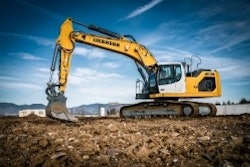You make your money moving iron. For that reason, it’s entirely forgivable if that’s where the bulk of your business attention is focused. But like it or not, trucks of all shapes and sizes affect your bottom line. If you’re like most contractors, you probably cut costs by buying used trucks and running them into the ground. No question you’ve saving money compared to the initial acquisition costs and depreciation associated with buying a brand-new heavy-duty truck. But – depending on how well you maintain those used trucks – you may be taking a hit on maintenance and the downtime it brings with it running older truck models in your fleet.
Even if you view trucks strictly as support items existing only to move iron to the jobsite or haul away material your machines have moved, getting a handle on your truck fleet costs is a shrewd business move.
One easy way to do that is through truck leasing programs. Truck leases have long been a standard financial arrangement for long-haul, regional and urban delivery trucking companies – businesses that are, admittedly in the trucking business and have powerful financial incentives to manage truck fleet costs.
For a variety of reasons, truck lease programs have never made many inroads in the construction industry. Ask around and you’ll hear a wide range of reasons why – contractor reluctance and the harsh applications their trucks typically work in are among the most common. All that may be changing, though. Even though you may be reluctant to explore heavy-duty truck leases, most of you now have a decade or more of positive leasing experience under your belts with fleet pickup trucks and even yellow iron. Because of these past leasing experiences, the idea of leasing a heavy-duty truck for your fleet may no longer seem intimidating or foreign.
“Manufacturers can talk about specific applications with contractors and make sure they get the right truck for their needs,” says Geoff Robinson, director, sales, marketing and remarketing for DaimlerChrysler Truck Financial, which recently introduced its Complete Lease Program at the NTEA Show in March. “This arrangement lets you manage your business while we manage your trucks – including sourcing, downtime, financing and service.”
Full-service truck leases are 100 percent tax deductible
Manufacturers recognize contractors are a vast uptapped pool of leasing revenue. Several major OEMs including Paccar, Freightliner, Volvo and GMC are now offering long-term vocational truck leasing programs squarely targeting construction companies.
“I don’t see leasing as a way to turn the used truck buyer into a new truck buyer,” says Terence Dubowick, director of leasing for Mack Leasing System and Volvo Truck Leasing System. “But for the typical new truck buyer, leasing frees them from having to make a long-term financial commitment – and in many ways can offer financial advantages superior to purchasing a late-model used truck.”
Truck leases are all about reducing the headaches associated with ownership, says Olen Hunter, director of sales for Paccar Leasing, which leases Kenworth and Peterbilt trucks through more than 270 dealers in North America. “In terms of statistics we’ve seen a 137-percent growth in on our vocational lease product line in the past couple of years,” Hunter notes. “I think several factors are driving that jump: First is the ability of our trucks to work well in vocational applications. Also, the average construction customer doesn’t put a lot of miles on his trucks. The vehicles are usually back home every night or parked on the jobsites. And keeping the trucks local has enabled many contractors interested in leasing to develop good relationships with our dealer group.”
According to Hunter, a full-service truck lease means you pay for the use of the truck, as opposed to paying for the truck itself. “That normally means big savings for contractors – up to 25 percent in a monthly lease payment compared to a truck you finance to own.”
In a lease, Hunter explains, the cost of the truck, apportioned tax and license, finance charges (a set interest rate for the lease term) and calculated cost-per-mile maintenance expenses minus the calculated residual value determine your monthly payment. “That may seem like a lot of charges,” he notes. “But in reality, it’s not. Keep in mind you’re dividing those costs over the life of the lease term – normally five to seven years.”
It’s that lower monthly payment that has many contractors sitting up and taking notice. Lowering monthly payments can immediately free working capital while keeping your business’s line of bank credit open for ongoing operations. “Leasing preserves capital that can be used for growth, expansion or purchasing additional inventory – all of which typically provide a higher return on investment when compared to purchasing rolling stock,” Hunter points out. “This can be critical for companies in growth or expansion modes.”
Even better, full-service truck leases are 100-percent tax deductible and the lease works as off-balance sheet financing to improve your key financial ratios. If you opt to purchase trucks, the IRS limits depreciation on equipment based on its assigned property class. The Modified Accelerated Cost Recovery System (MACRS) established by the IRS governs how much per year, and over how many years an asset is depreciated. Tractors are considered a three-year property class, while straight trucks are classified in the five-year property group.
“You have to understand what your business plan is and how you expect a truck lease to contribute to it,” Dubowick adds. “But for the most part, truck leases are beneficial, particularly if you don’t want to take the depreciation credit on your trucks. And outwardly, you’re getting a newer-looking truck for your business. People on the street don’t know whether you own or lease that truck. It’s still going to have your company’s name on it. The driving reason for leasing is financial – it’s a tax-based decision.”
A single-source, cradle-to-grave care-giver for your truck
But there are other advantages to leasing besides catching a tax break. “Financially, leases are highly attractive to contractors,” Robinson notes. “But the convenience a lease offers a small-business owner is what can really seal the deal.”
According to Robinson, a truck lease, when implemented and carried out properly, makes things easier for a business as a whole. “A truck lease allows you to outsource a large number of truck-related tasks that can interfere with your core competencies,” he explains. “Organizing and scheduling maintenance now become the truck dealer’s responsibility. That dealership becomes a single-source, cradle-to-grave caretaker for your trucks, offering significant cost-savings in the process.”
Once you’ve committed to a lease, the dealership assumes all preventive and scheduled maintenance requirements for that truck for the duration of the lease. “Through our dealers, we put our eyes on that truck every 12,500 miles or 90 days – whichever comes first,” Hunter notes. “So our responsibility is to keep the equipment up from a mechanical perspective. And that helps us maintain the trucks properly even in severe service conditions. In the event the customer does need to bring the truck back and return it to us, our turn-in conditions are pretty simple: There can’t be any more than $250 worth of physical damage to the equipment, no broken glass, and all the knobs and buttons have to be present. In addition, its tires and brakes have to have at least 50 percent life left on them.”
And once the lease contract is done, Hunter says dealerships can still be helpful in either disposing of the truck, or working it into a fleet as a purchased item. “Our leasing companies have a lot of experience in the used truck sales side,” he points out. “So we know with some certain predictability what the residual value of that equipment’s going to be at the end of its lease contract. That way you’re not paying for the full value of the vehicle over four or five years, then turning around and parking it on the street with a for sale sign on it. Used truck sales aren’t your business, after all.”
Hunter says most contractors wind up keeping the trucks they lease once the contract has ended. “What we typically see is a customer will put the equipment on an initial lease term. And in our vocational lease agreement we offer them the ability to purchase it at a TRAC value or terminal rental adjustment cause value at the end of the lease term, which is close to real world market value at that time. So you can run it in a heavy-duty application, then buy it out for the truck value and put it into a secondary use as jobsite equipment or a water truck. And that way, you know exactly how a used truck has been maintained and treated by its previous owner – because that previous owner was you.”






